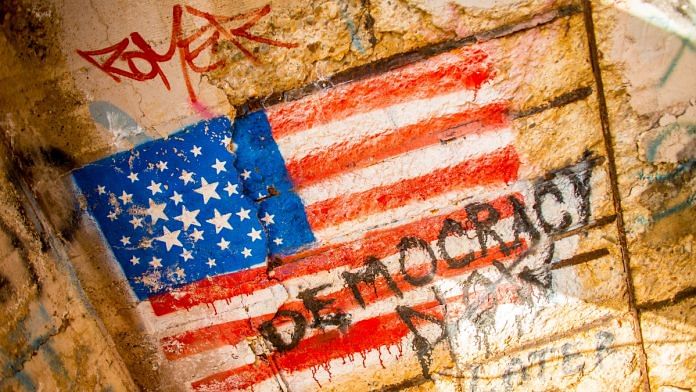Thank you dear subscribers, we are overwhelmed with your response.
Your Turn is a unique section from ThePrint featuring points of view from its subscribers. If you are a subscriber, have a point of view, please send it to us. If not, do subscribe here: https://theprint.in/subscribe/
The USA project themselves as the datum for all democracies and make it a point to poke their nose in all other democracies and also non democracies. The recent comment by the State department in which the USA hoped that the recently arrested Arvind Kejriwal, CM of Delhi, on corruption charges, is given a fair legal process. This from a “democracy” in which all judicial posts including on the bench of the Supreme Court of The United States, are political appointments. Here is a sample from the US media – Liberal presidents pick liberal nominees and conservative presidents pick conservative ones. Here is another one. The federal judiciary is a cesspool of partisanship, and now it’s being asked to oversee some of the most politically fraught criminal trials in American history.
When we look closely American society is no different from the rest of the world. It is largely disorganized and deeply divided. There is rampant mistrust, discrimination and fear in the society. The relatively high crime rate and trigger-happy citizens there are definitely not because people are happy. But the USA sweeps these aspects under the carpet while commenting on other democracies which have radically different requirements. Pew research has this to say. Race and ethnicity: 88% of Black adults say people overlooking discrimination is the bigger problem. Smaller majorities of Asian (66%) and Hispanic (58%) adults say the same, as do 45% of White adults –
A study of the journey of democratic nations will reveal democracy is not a panacea. It affords freedom yet freedom is not an absolute. It is true that in any democracy, the stronger the Government or a leader, there will be attempts to control the official machinery like the secret services, tax authorities, the police, the media and often the judiciary, to tilt the scales in their favor. Any government at the helm will not want to lose this “power”. That is the way of democracies – a very dangerous and fearsome possibility. Yet, in a federal, vibrant and diverse democracy like India it is very difficult any one party to really dominate as to “destroy” democracy is evident from a few realities. Only about 1400 out of a total of 4000 Federal legislators are from the ruling party from the center, meaning that about 18 federal states are ruled by parties other than the party at the center. In the last general elections in 2019, the ruling party got only 38% of the popular votes cast – 72% electorate voted for other parties.
There is no real mainstream media anymore, with major media houses owned by conglomerates tilted towards one political disposition or the other. People, the people especially the x, y, z generations get their news from the social media platforms. The media and especially the social media are free, spawning many dedicated channels censoring the Government. Many including senior political leaders in their interactions with the media denigrate opposing political leaders even calling them names. The manner in which the media has proliferated in the last two decades or so, a free and responsible press is contradictory in some places and impractical in others. Yet, it would become a part of journalistic canon as it articulated the complexities of establishing and maintaining a free and responsible press. The “consensus” of the liberal brigade is that any regulation of the media must come from within, not from the government. Well, the simple matter of its viability, what with the proliferation of digital / social media is, to say the least, suspect.
As a consequence, international media, with or without the knowledge of the respective state or the deep state, started its influential campaign against the governments of other states. This has been blatantly practiced by the western media and erstwhile colonizers against the freed colonies and other developing nations for decades. Having a lead in creating large media houses, with tacit complacency of the respective governments, the western media did succeed in condemning third world societies and governments to a great extent. But not anymore. This game has been wholly exposed by none other than the digital media.
The deep state of some nations, maintained its hold on developing nations by tacitly supporting NGOs in target nations, ostensibly funded by some philanthropic organizations. The digital media has been able to uncover this dark game too.
Tailpiece: India is a civilization that has withstood the assault of about a dozen empires attempting to destroy it. The Nation is obviously resilient in the federal structure and the judiciary (though requiring a few reforms) and a free social media – the mainstream media, like in all democracies, have unfortunately become partial and parochial. In tandem, both sides of the stories are told by one or the other. Rest easy, Indian democracy is safe.
These pieces are being published as they have been received – they have not been edited/fact-checked by ThePrint

